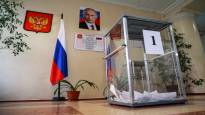MOSCOW The weekend regional and local elections in Russia seem to have gone as expected from the Kremlin’s point of view.
For the internal political machinery of the presidential administration, the elections were a test before next year’s presidential elections, in which Vladimir Putin is set to get an even more impressive share of the vote in order to assert its power.
Elections at various levels were held over the weekend in no fewer than 49 regions. Among other things, governors, regional parliaments, mayors and city councils were elected in them.
No one is surprised that the ruling party United Russia won almost all the elections.
In all regional parliament elections, the party won more than two-thirds majority.
The so-called elections were also held in the territories occupied by Ukraine. In the conditions of occupation and war, they can be considered show elections. United Russia got about 70–80 percent of the votes.
The Russian political system has not been able to will remain truly competitive for a long time to come.
Those in power have a wide range of tools in their toolbox with which to twist the election results in the desired direction: Unwanted candidates and parties can be left out of the elections, and employees of the public sector and state-dependent companies can be marched to the ballot box. In addition, electronic voting makes monitoring elections even more difficult.
Election monitoring has also been made more difficult by force.
Chairman of the Golos election monitoring organization, declared a foreign agent Grigori Melkonyantsia was charged in August with organizing the activities of an unwanted organization. He is in pre-trial detention, and the homes of several employees of the organization have been searched.
Despite everything, the regional and local elections occasionally showed flare-ups of genuine competition. It seems to rub off on the officials responsible for domestic policy in the presidential administration.
It was important for the Kremlin to weaken the positions of the country’s second largest party, the Communists, writes the journalist Andrei Pertsev On the Meduza news site.
In this way, it would be easier to control the party if the country’s economy significantly weakens.
The communists received a lot of protest votes in the 2018 regional and local elections, when Russians were irritated by the increase in the retirement age and the general decline in living standards. Now, elections were held in many of the same regions as in 2018.
Those in power did not want to see a repeat of the 2018 protest vote. The goal seems to have been achieved: in many regions, the Communist Party fell from the second largest place in the elections.
The Kremlin is always less tolerant of any kind of dissent. Even famously loyal parties such as the Communists have to operate at the end of an increasingly short rope.
One of the few exceptions last weekend was the Republic of Khakassia, where the Communist Party candidate Valentin Konovalov managed to keep his place as head of the republic. Hakassia, with more than half a million inhabitants, is located in Southern Siberia.
On the other hand, United Russia won the majority in the Khakassia regional parliament.
In the Republic, the situation even seemed genuinely competitive, as United Russia tried to get its own man elevated Sergei Sokolin to be the head.
That’s why we traveled to listen to the atmosphere in the republic of more than half a million inhabitants. However, the competitive situation died down when Sokol withdrew his candidacy at the last moment due to a serious illness.
It was still noticeable in Hakassia a certain tension. The press representatives of the communists and liberal democrats promised before our trip that interviews would be arranged, but became uncooperative when we arrived in the village.
The local representative of the Liberal Democrats even hinted that Moscow had refused. It’s no wonder that Russian politicians don’t talk to the NATO country’s media. What good would it do them?
In Khakassia, the Putin regime’s actions apparently irritated the local elite. In the end, the political curators of the Kremlin had to accept an incomplete election result in order to avoid excessive disputes. Konovalov can hardly expect easy times in his relationship with the central government.
All in all, fewer and fewer are ready to go as an actor in an election play. Both the number of candidates and the number of parties participating in the elections has decreased.
In the 2018 elections, which were tinged with protest voting, there were an average of 7.8 candidates for one gubernatorial seat. This year, the number was only 5.2.
In 2018, an average of 8.7 parties applied for parliamentary seats from party lists, while this year only 7.1.
Golos election monitoring organization Stanislav Andreichuk ponders the reasons On the Re:Russia website.
He points out that businessmen have often participated in politics in the regions, for whom participation in politics can also bring benefits in business life.
In the conditions of a tightening economy and sanctions, the willingness to enter politics has weakened.
The tightened atmosphere will certainly have an effect as well. The security services have tightened their grip, and almost all parties have members who have fallen into the teeth of the machine. Most of them are in the ranks of the communists.
At the same time, the war seems to have become an elephant in the living room of Russian politics: in their campaigns, the parties did not loudly appeal to a “military special operation”, as the war of aggression is officially called in Ukraine.
For example, in Khakassia, United Russia’s candidate Sergei Sokol had to be strong, because he had at least nominally participated in a “special operation”. Still, his campaign didn’t take off.
It seems that war is not an election topic that particularly excites Russians.
